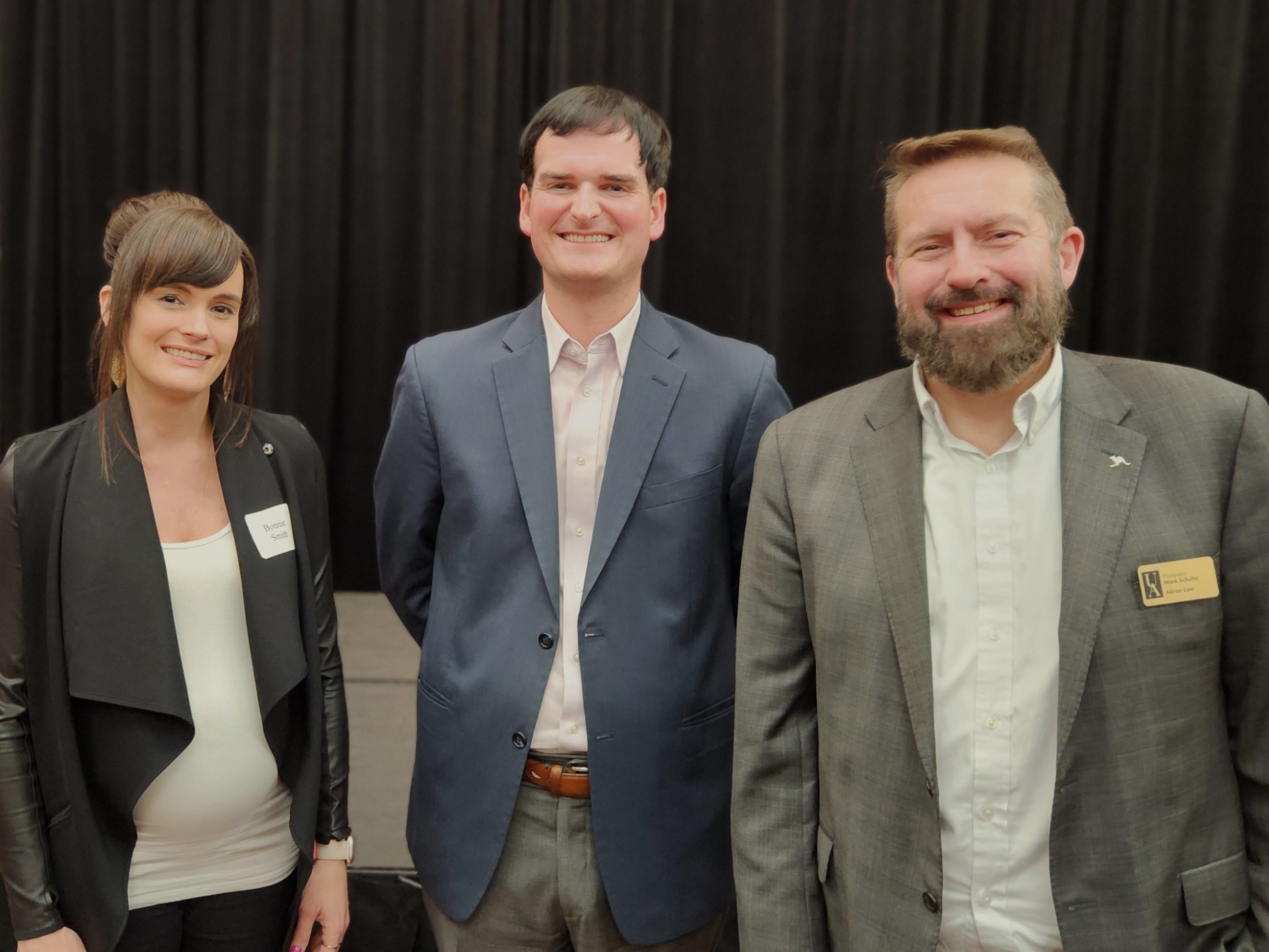Beltway insider explains how politics shape IP law in UA talk

Left to right: CIPLA President Bonnie Smith, senior intellectual property counsel at Rockwell Automation; speaker Brad Watts, vice president, patents and innovation policy at the U.S. Chamber of Commerce; Akron Law Professor Mark Schultz.
The November 2023 meeting of the Cleveland Intellectual Property Law Association (CIPLA) held at The University of Akron featured Brad Watts, former chief counsel to Senator Thom Tillis (R-NC), former Republican chief counsel on the U.S. Senate Judiciary Committee Subcommittee on Intellectual Property and current vice president, patents and innovation policy, in the Global Innovation Policy Center at the U.S. Chamber of Commerce.
Watts was introduced by Akron Law Professor Mark Schultz, Goodyear Tire & Rubber Company Chair in Intellectual Property Law and director, Intellectual Property and Technology Law Program. “We were pleased to once again host a CIPLA event and bring in a national-caliber speaker like Brad Watts,” Schultz said. “Events like this serve our local legal community while giving our students the opportunity to learn from and network with practitioners.”
Watts shared with the audience of current and future intellectual property (IP) practitioners that the key to understanding how Congress makes IP law is in knowing that IP is one of those rare areas that is not partisan.
“Now that doesn’t mean that there aren’t disagreements, but they don’t break down along Democrat and Republican lines,” Watts said. “There were plenty of times where we would partner on intellectual property issues with Democrats who we wouldn’t partner with on any other issue.”On the other hand, achieving consensus in an area like IP is inevitably going to be difficult because most members of Congress aren’t IP experts. Watts relies on three indicators to decipher how an individual is likely to think about IP.
First is the member’s background or personal experience. “There are members of Congress who are patent owners or were IP practitioners, or who did business development deals and licensing. The late singer-songwriter and California Congressman Sonny Bono, half of the popular 1960s and ‘70s duo Sonny and Cher, had strong views on copyright,” Watts noted.
Second is a member’s geographic interest or constituency. “If they want to remain a member of Congress, they probably have to reflect their constituency. Members who come from a state with a high presence of life science companies are probably going to have strong pro-pharma views. Members from states with large agricultural interests are likely to have a favorable view of right-to-repair laws,” Watts said.
The third indicator is the member’s underlying philosophy. Do they believe that intellectual property is central to innovation and economic success and is a source of social good? Or do they believe that all a patent does is lock up knowledge for the benefit of a few?
Another common misperception of Congress is that it is “a purely majoritarian institution,” Watts said. “And that is true on a handful of major policy issues such as tax reform. Outside of that, almost all policy reform occurs through consensus, meaning you have to secure almost overwhelming support in the House and the Senate. Patent eligibility reform is a great case study in how a single senator took an issue and made it a national priority,” Watts said.
When Sen. Tillis became chairman of the Intellectual Property Subcommittee in 2017, he heard from individual companies and from groups like the American Intellectual Property Law Association and the American Bar Association Section of Intellectual Property Law that companies couldn’t make predictable investments as a result of a series of Supreme Court decisions from the 2010s that left the law in disarray.
“That swell of engagement convinced Senator Tillis that we had to make this a tier one priority,” Watts said. “He set out on a years-long process of trying to bring forward a patent eligibility bill.”It wasn’t until August 2022 that the senator introduced a bill. The bill did not advance, but it was reintroduced this past June, so it is still a work in progress, Watts said.
The difficult path this legislation has faced highlights one of the two “almost existential threats to the IP system. A view of IP as an inhibitor to social good...is probably the prevalent strain now among thought leaders and policy makers,” Watts said. Reasserting why IP is important is a challenge the Global Innovation Policy Center has taken on.
The other challenge Watts sees is the unitary IP system where patents and copyrights and trademarks are viewed as unique, distinct silos that never intersect.
“That’s worked for a long time,” he said, “but I don’t know if it can exist much longer the way technology is advancing. With AI-generated innovation, we’re seeing the technology and art sectors starting to combine. How do we regulate this increasingly morphed bucket of property rights? I don’t know what the answer is. I don’t think anyone knows what the answer is.”
